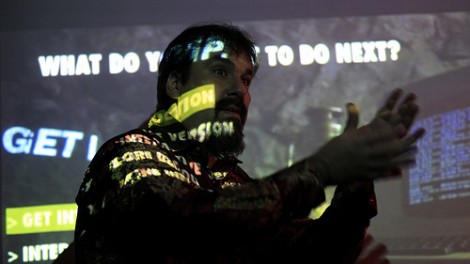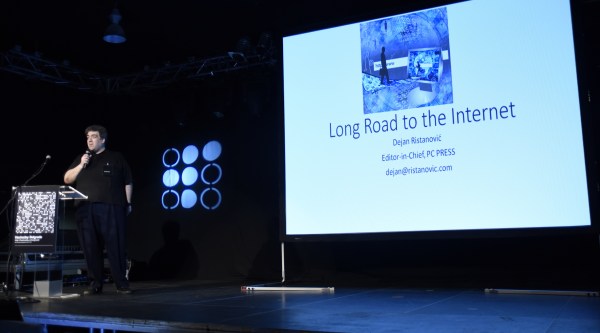It’s 5 pm, the sun is slowly setting on the Leipzig conference center, and although we’re only halfway through the first day, there’s a ton that you should see. We’ll report some more on the culture of the con later — for now here’s just the hacks. Continue reading “34C3: The First Day Is A Doozy”
bbs22 Articles
BBSing With The ESP8266
Modems have been around for longer than the web, and before we had Facebook we had the BBS scene. Somewhat surprisingly, people are still hosting BBSes, but have fun finding a landline these days. [Blake Patterson] is one of the leading aficionados of retocomputers, and recently he took it upon himself to review an interesting new device. It’s the WiFi232 Internet Modem, a device that turns a WiFi connection into something a computer with a 25-pin RS-232 connector can understand.
The WiFi232 is made by [Paul Rickards], and given the last few years of WiFi-enabled retrocomputing projects, it’s exactly what you would expect. Onboard the WiFi232 is an ESP8266 module emulating the Hayes AT command set. Baud rates from 300 to 115200 are supported, with power provided through a USB mini jack or solder terminals.
[Blake]’s computer den is the stuff of legend, and as such he has more than enough toys to test out this universal WiFi to Serial converter. Devices used in the test include the Apple //c, IIe, Amiga 1000, and TI-99/4A. In short, everything works just like it should. [Blake] was able to pull up the extant bulletin boards on his collection of ancient computers. You can check out [Blake]’s review of the WiFi232 below
Getting The Amiga 500 Online
If you were lucky enough to have a Commodore Amiga or one of its competitor 16-bit home computers around the end of the 1980s, it’s probable that you were doing all the computing tasks that most other people discovered a few years later when they bought their first 486 or Pentium. So in the mid 1990s when all your friends were exclaiming at Paint Shop Pro or their Soundblaster cards you’d have had an air of smugness. Multitasking? Old hat! Digital audio? Been there! Graphics manipulation? Done that!
There was one task from that era you almost certainly wouldn’t have done on your Amiga though, and that was connect it to the Internet. The Internet was certainly a thing back in the late 1980s, but for mere mortals it was one of those unattainable marvels, like a supercomputer with a padded seat round it, or a Jaguar XJ220 supercar.
Later Amigas received Internet abilities, and Amiga enthusiasts will no doubt be on hand to extol their virtues. But the machine most people will think of as the archetype, the Amiga 500, lacks the power to run most of the software required to do it. If your 500 with its tasteful blue and orange desktop colour scheme is languishing though, never fear. [Shot97] has produced a guide to getting it online.
It’s important to understand that an Amiga 500 is never going to run a copy of Chrome or play a YouTube video. And he makes the point that any web browsers that might have surfaced for hardware of this class delivered a painful browsing experience. So instead he concentrates on getting the 500 online for something closer to the online scene of the day, connecting to BBSs. To that end he takes us through setting up a PC with Hayes modem emulator, and connecting it to the Amiga via a null modem cable. On the Amiga is a copy of the A-Talk terminal emulator, and as far as the Amiga is concerned it is on a dial-up Internet connection.
The PC in this case looks pretty ancient, and we can’t help wondering whether a Raspberry Pi or even an ESP8266 module could be put in its place given the appropriate software. But he has undeniably got his A500 online, and shown a way that you can too if you still have one lurking in the cupboard. He has also produced a video which we’ve put below the break, but be warned, as it’s nearly an hour long.
The Long And Bumpy Road To Internet In Serbia
Internet is taken for granted. These days you assume there is Internet and only wonder if there is free WiFi to get onto it. But in the early days, connecting to a network could be tough and this was particularly true in Serbia. The country’s Internet revolution was complicated by both technology and politics, but the vibrance of the tech community always found a way.
The story is a fascinating one shared by Dejan Ristanovic at the Hackaday | Belgrade conference. He is now the Editor-in-Chief of PC Press computer magazine and played an integral part in providing global email access to Serbia. Enjoy the video of his talk below and join me after the break for a few highlights.
Continue reading “The Long And Bumpy Road To Internet In Serbia”
Hackaday Links: April 13, 2014
![]()
Check out this Pokemon Yellow cartridge for Super Nintendo. Wait, what? That is a Game Boy game! Well there is a Super Gameboy cartridge that lets you play them on SNES. This mashes the guts of the two into a custom-decorated SNES cart. Now if you’re more interested in the guts of that Super Game Boy cartridge you’ll want to check out this classic hack which dumped the ROM from it. [Thanks Nick]
Here are a couple of interesting things from our friends over at Adafruit. First off, they have a high-res gallery of the Raspberry Pi compute module and carrier boards which we heard about earlier in the week. Also, the latest Collin’s Lab has a great video on soldering. We especially appreciated the discussion of soldering iron tips and their effect on heat transfer.
[Marius] got tired of the static shock from the office coat rack. You know, like the scene straight out of Office Space? But he didn’t disassemble the infrastructure to solve the issue. Instead he connected it directly to ground. Just make sure you stick the wire in the correct hole!
It’s as if Hackaday is on a quest for the most perfect DIY cyclonic separator. Here’s the latest offering which you can cut out from sheet stock by hand. It’s the alternative for those of us without access to a 3D printer.
If you think it’s too difficult to build what we refer to as a Daft Punk table you need to check out what [Dan] pulled off. He proves that your LED matrix coffee table project doesn’t have to take up a ton of time or cost an exorbitant amount of cash.
We should have mentioned this to you before the weekend so you’d have something to watch: you can now download BBS: The Documentary from the Internet Archive. We’ve watched the entire thing and it’s fantastic. If you know what a dial-up modem handshake sounds like, you’re going to be awash in nostalgia. If you don’t know the delight of those sounds you need to watch this and see how things used to be back in the day when connecting your computer to a network definitely wasn’t what the cool kids were doing. [Thanks Larry]
Reliving The BBS Days With A Propeller

Back before the world wide web, self-proclaimed geeks would get our compute on by dialing in to bulletin board systems. In their heyday, these BBSes were filled with interesting people and warez to fill the most capacious 10 Megabyte hard drive. In an attempt to relive the days of the Internet before the Eternal September, [Jeff Ledger] whipped up a tutorial for dialing up BBSes with an updated classic computer.
Instead of doing this tutorial with a C64 or an Apple II, [Jeff] used the Propeller powered Pocket Mini Computer he designed. This computer features 32Kb of RAM inside an eight-core Parallax Propeller along with a BASIC interpreter to run your own programs.
This Mini Computer can connect to BBS systems, but seeing as how acoustically coupled modems are rare as hen’s teeth these days, [Jeff] thought it would be a good idea to log in to the many Internet connected BBS servers using his desktop as a bridge between the Propeller and the Internet.
After [Jeff] got his Propeller computer up and running on a BBS, he was free to play Trade Wars or slay grues in one of the many MUDs still running. Not bad for a demonstration of the Internet of old, and made even better by the use of a Propeller.
[Jason Scott] Gets A Job In A Candy Factory — Kinda

Remember when you used to have to dial into a Bulletin Board System to connect with others through computers? How about those fond memories of phone phreaking? If you find that the details are fading in your mind you’ll be happy to know that [Jason Scott] is making sure they’ll never be forgotten. And now he’s landed a new job that will make this mission even easier.
We’re most familiar with [Jason’s] film, BBS: The Documentary. This five-hour epic traverses the oft-forgotten world of the BBS. It pays attention to things like the formation of ASCII art groups, the elite control of the Sysop before the Internet decentralized access to information, and quirky technological limitations like what happened as FIDOnet ran out of addresses for new nodes.
In short, [Jason Scott] is a technological historian. He gives speeches, makes movies, and finds information stashes that history shouldn’t forget. He’s done this outside the tradition of finding a Professorship or Curator position for a major institution. Instead he asked for sabbatical funding through Kickstart, and now he’s found his way to a position that seems like it’s made just for him; Archivist for the Internet Archive. Go get ’em [Jason].















